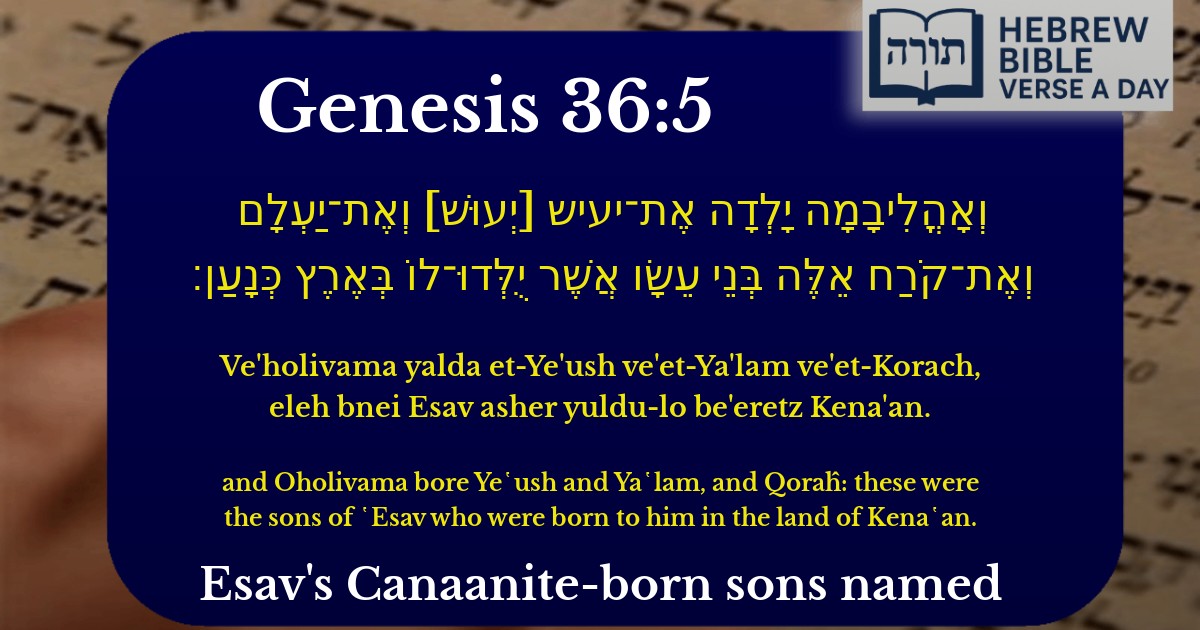Join Our Newsletter To Be Informed When New Videos Are Posted
Join the thousands of fellow Studends who rely on our videos to learn how to read the bible in Hebrew for free!
Hebrew Text
וְאָהֳלִיבָמָה יָלְדָה אֶת־יעיש [יְעוּשׁ] וְאֶת־יַעְלָם וְאֶת־קֹרַח אֵלֶּה בְּנֵי עֵשָׂו אֲשֶׁר יֻלְּדוּ־לוֹ בְּאֶרֶץ כְּנָעַן׃
English Translation
and Oholivama bore Ye῾ush and Ya῾lam, and Qoraĥ: these were the sons of ῾Esav who were born to him in the land of Kena῾an.
Transliteration
Ve'holivama yalda et-Ye'ush ve'et-Ya'lam ve'et-Korach, eleh bnei Esav asher yuldu-lo be'eretz Kena'an.
Hebrew Leining Text
וְאׇהֳלִֽיבָמָה֙ יָֽלְדָ֔ה אֶת־<span class="mam-kq"><span class="mam-kq-q">[יְע֥וּשׁ]</span> <span class="mam-kq-k">(יעיש)</span></span> וְאֶת־יַעְלָ֖ם וְאֶת־קֹ֑רַח אֵ֚לֶּה בְּנֵ֣י עֵשָׂ֔ו אֲשֶׁ֥ר יֻלְּדוּ־ל֖וֹ בְּאֶ֥רֶץ כְּנָֽעַן׃
וְאׇהֳלִֽיבָמָה֙ יָֽלְדָ֔ה אֶת־[יְע֥וּשׁ] (יעיש) וְאֶת־יַעְלָ֖ם וְאֶת־קֹ֑רַח אֵ֚לֶּה בְּנֵ֣י עֵשָׂ֔ו אֲשֶׁ֥ר יֻלְּדוּ־ל֖וֹ בְּאֶ֥רֶץ כְּנָֽעַן׃
🎵 Listen to leining
Parasha Commentary
📚 Talmud Citations
This verse is not quoted in the Talmud.


The Sons of Esav in Canaan
The verse lists the sons of Esav (Esau) born to his wife Oholivama in the land of Canaan. According to Rashi (Genesis 36:5), the mention of their birth in Canaan is significant because it contrasts with Esav's later decision to leave Canaan for Seir (Genesis 36:6-8), demonstrating his voluntary relinquishment of any claim to the Land of Israel—a key theme in the Torah's narrative of Yaakov (Jacob) inheriting the covenant.
Names and Symbolism
The names of Esav's sons—Yeush, Yaalam, and Korach—carry deeper meanings as interpreted by Midrashic sources:
Oholivama's Role
Oholivama (also called Yehudit in Genesis 26:34) was a daughter of Anah, a descendant of Seir the Horite. Ramban (Genesis 36:2) emphasizes that her Canaanite origins reinforced Esav's ties to the land, yet his eventual departure underscored his divergence from the spiritual destiny of Yaakov.
Historical Context
The Talmud (Avodah Zarah 11a) discusses how Esav's descendants—particularly through these sons—formed powerful nations (e.g., Amalek from Timna, a concubine of Elifaz, Esav's other son). The listing of these names in the Torah serves as a historical record of rival nations and their origins, as elaborated in the commentary of Radak.